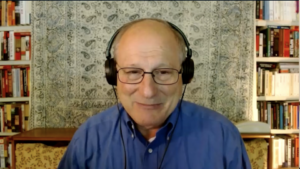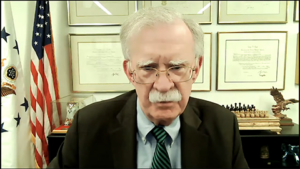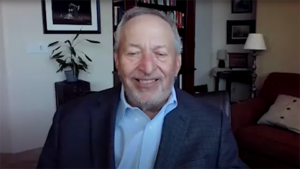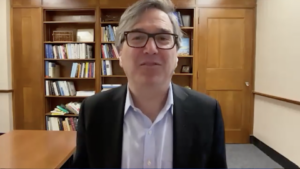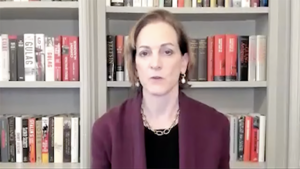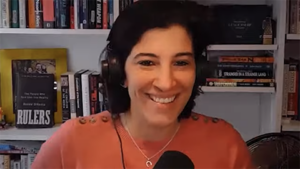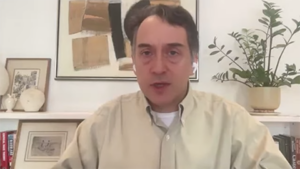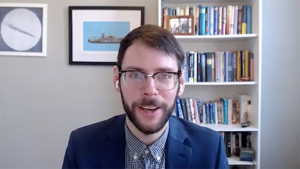Donald Trump will face major geopolitical challenges when he takes office.
In this Conversation, Eric Edelman, former ambassador to Turkey and Finland and Under Secretary of Defense, shares his perspective. As he explains, Trump will face major decisions on all areas of the geopolitical landscape early in his term. Edelman argues that Israel’s military successes have weakened Iran’s “axis of resistance” and opened up new opportunities—but also raise the threat of Iranian nuclear breakout. Meanwhile, the war in Ukraine rages, the situation in Europe remains uncertain, and China’s military buildup increases. To meet the threats around the globe, we need to build up the military and defense industrial base, embrace American leadership, and strengthen our alliances. Will the Trump Administration do so?
EDELMAN: You have a Middle East that is on fire with the aftermath of the October 7th Hamas attack on Israel, and it's a dramatically different Middle East than the one that Donald Trump left behind when he left office in January '21. Notably, Hamas has been essentially destroyed as a military force. I mean, there's a burbling insurgency in Gaza that Israel will have to figure out how to deal with, and right now it's got its finger in the Chinese finger trap. It's destroyed Hamas, but it can't quite extricate itself from governing Gaza right now, which I don't think any sane Israeli wants to do, although there's some voices arguing for it. Israel has essentially eviscerated Hezbollah, which was its biggest threat to the north, and now, in a rippling cascade effect, the Assad regime has collapsed in Syria. And that has really put Iran on its back foot. And I think, as dramatic as the events in Syria are, the most important two things that represent… One is that Iran has lost the ability to reconstitute easily and resupply Hezbollah in Lebanon, which was its major deterrent to Israel. And by the same token, it has been moving very aggressively to enrich uranium at levels of 60%, which is very, very close to having fissile material for a nuclear weapon. So, Trump is going to inherit an Iran that is both moving rapidly towards a nuclear weapon, where there's an active debate inside the country between those who want to move, having lost all these other instruments to threaten Israel and the United States, its network of proxies, to nuclear weapons as a deterrent against its adversaries, but also, because of the Israeli strike on October in the aftermath of the October 1st Iranian attack, essentially Iran has been denuded of its air and missile defense, and so it's both moving towards a nuclear weapon but also has never been weaker than it is today. Trump will inherit this, I think, as one of the most important burning issues on his agenda.
EDELMAN: And while they get a lot of credit, and I think more credit than some quarters of Conservatism Inc. are willing to give the Biden administration for supporting Israel, it's also the case that, had the Israelis followed all of the advice of the Biden administration, we would not have seen this gigantic shift in the balance of power in the Middle East. We should not forget that the Biden administration cautioned the Israelis about going into Rafa. Now, maybe some of that caution led the Israelis to be a little bit more careful about collateral damage when they went into Rafa, but if they had followed all the advice of the Biden administration, they would not have successfully, essentially destroyed Hamas as a military force. The Biden team said, "Don't go north into Lebanon." And they managed to completely destroy Hezbollah as a proxy force–not completely, but eviscerate them. They're incredibly weak now. Up until two weeks before the Assad regime fell, the Biden administration was trying to grab onto the coattails of the Arab countries that were normalizing with Assad and trying to normalize with Assad as well. So, they've been way behind in all of this. On Iran, they came in with a pledge, both in the Democratic platform and orally, to negotiate a longer, stronger agreement on nuclear weapons with Iran. And from the get-go, Secretary Blinken kept saying, "We don't have unlimited time for negotiations, very limited time." But he said that for 18 months, and then when the Iranians pulled out of the negotiations, there was no plan B for the administration. They just defaulted. They had testified that there was no military solution to the problem of Iran, which doesn't look to be like a fact now, in light of what Israel has been doing. And they said diplomacy is the only solution, but they weren't engaged in diplomacy, so in effect, they had no policy on Iran, which is how we got to where we are.
EDELMAN: Turkey is clearly the big winner here. They'll have enormous influence with HTS, obviously. They're also going to play a very big role in the reconstruction of Syria because Turkish construction companies have been very active throughout the region. They're very good, so they will almost certainly be involved in the reconstruction of Syria, so he [Erdoga] will have outsized influence. He won't be dispositive. He won't be able to tell them exactly what to do, but he will be the most influential foreign player in Syria. The other issue that's left there though, that the Turks are involved in with us, is that one of the sources of Erdogan's discontent at the situation is Syria is the fact that there is an autonomous self-governing Kurdish enclave, which has been governed by forces allied with the PKK, which is the Kurdish Workers' Party in Turkey. It's a Marxist-Leninist Kurdish group that has waged a very long, bloody insurgency in Southeastern Turkey. Erdogan has sworn that he will stamp all this out. He doesn't want Rojava, this enclave, to succeed. His forces are the proxy forces and Turkish forces gearing up on their side of the border for a major incursion. There's already been fighting with the SDF, which is the Kurdish force that the US has been working with to keep control of the ISIS remnants in central Syria, of whom there are quite a few, and a number of prison facilities, which house ISIS fighters who've been taken off the battlefield. And so, there's concern on the part of the US government that if the SDF is forced away from their positions, they'll abandon these prisons, and these ISIS fighters will be on the loose, which will be a threat to Syria, to the region, to the United States. There's the US presence of some 2,000 Special Forces guys at the air base in Tanf that oversee all this. Question for Trump: are you going to leave them or pull them out? My view would be: it's very low visibility and low cost.
EDELMAN: President-elect Trump has appointed Keith Kellogg, who was, I think, the Executive Secretary or Chief of Staff of the National Security Council for the first couple of years of the first Trump term, and then was Mike Pence's National Security Advisor at the end of the first Trump term as his Ukraine negotiator. And Kellogg is the co-author with Fred Fleitz, another former NSC staffer in the first Trump term, of a paper that the America First Institute put out in April that sketched out what a negotiation might look like, which did talk about security guarantees for Ukraine, arming Ukraine. Vice President-elect Vance has also talked about a settlement in which a Ukraine would be somehow armed to the teeth to provide security and guarantees against further Russian military activity, so it's a little unclear exactly what position they're going to take. I do think that the situation on the battlefield has gotten very bad, which is the Ukrainians have been losing ground at a more rapid pace. It's still not huge swaths of territory, so it's easy to over-exaggerate how badly it's going, and the cost to the Russians has been absolutely extraordinary. The British Chief of Defense, Tony Radakin, gave a speech at RUSI a few weeks ago, in which he suggested that the losses may be as high as 700,000 killed and wounded, with the killed up around 150,000. This is just incredible losses that the Russians are taking. It’s not clear how long they can sustain that. The Russian economy is overheating. Putin had to answer a lot of questions about inflation from average Russian citizens. The Financial Times had a lovely story about the Russian economy a couple of weeks ago in which they talked about grocery stores putting butter under lock and key because it's so hard to get a hold of, and the price is so high. And the events in Syria as well, and the weakening of Iran. Syria was a major Russian client, and to have Assad taken off the board and flee to Moscow is an indication of Putin's weakness. If there's anything that Donald Trump understands, it's strength and weakness. It depends on who's going to be briefing him, of course. One would think that Mike Walz and Marco Rubio, who have traditionally been pretty firm supporters of Ukraine, or were at the outset of the war, less so this past year when they were among those who voted against the April assistance package, but who certainly understand the dynamics here… There is a possibility that Trump might see it in his interest to strengthen Ukraine in order to get Putin to the table and get a negotiated settlement. But on the other hand, you can also see certain forces saying, "Just cut off the Ukrainians."
EDELMAN: President Kennedy, in the spring of 1963, six months before he was killed, was asked what kept him up at night most in a press conference, and he said, "The prospect that at the end of the decade will have 20 nuclear powers in the world." Well, at the time he spoke, there were four nuclear powers. Shortly after he died, a fifth, China, tested a nuclear weapon, and he clearly had them in mind because he knew they were working on a nuclear program. Flash forward 60 years, we only have nine nuclear powers, which is a lot less than 20, and that's because of the workings of the Nuclear Non-Proliferation Treaty. But you're a hundred percent right, US nuclear extended deterrence through our system of alliances, whether our multilateral alliance in Europe with NATO, or our bilateral alliances with Japan, the Republic of Korea, Taiwan at one time, Australia, New Zealand, has been the biggest guarantor against nuclear proliferation. And one reason why, when we opened this conversation, I opened with Iran: Having Iran with a nuclear weapon's already problematic, just in its own right, but the other reason it's problematic is because I think most observers believe it will be the final nail in the coffin of the Non-Proliferation Treaty, because Saudi Arabia, Turkey, Egypt used to have a nuclear program, maybe Jordan, Algeria once upon a time had a nuclear program. There will be a cascade. It won't maybe be immediate, but it will be certain that other countries will move in the direction of self-help with nuclear weapons, rather than relying on US alliances. And that is not only going to lead to a much more unstable world, with a lot of countries with nuclear weapons very short distances from one another, with very short flight times, it means that these things will be potentially used in anger, which they haven't been since 1945.
